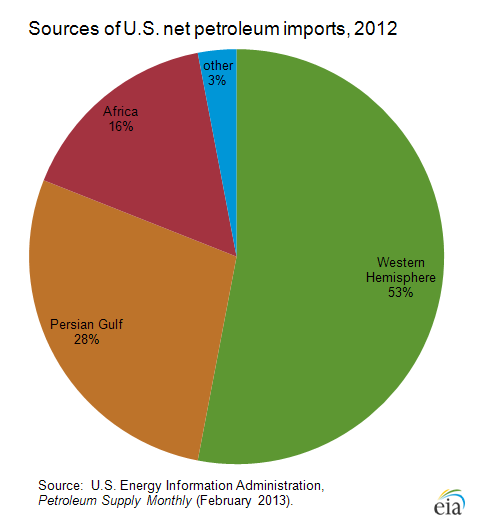Crude oil and internal combustion engines are a part of our lives. Crude oil refines into the primary energy that gets our vehicles around today. It’s what powers our cars and trucks on freeways across America every day. Crude oil is responsible for many jobs and products across our country and around the world. RMP takes those jobs, especially the jobs in America, very seriously. We feel a great responsibility to make sure it is well understood that we care about jobs provided by the oil & gas industry to Americans and people around the world. RMP advocates, however, for an immediate and responsible migration away from crude oil as a fuel source. By ramping up the displacement of internal combustion engines with fuel cell electric vehicles (FCEVs), like the Toyota Mirai pictured above, America’s economy and national security will improve. Mirai is the Japanese word for future.
RMP’s plan envisions FCEVs steadily replacing internal combustion engines and responsibly displacing demand for crude oil while creating jobs that build a new domestic energy infrastructure. RMP will demonstrate economic benefits of this plan as well as cost savings related to our military spending. America’s military spending represents 21% of our national budget. We can stop millions of dollars of US treasure from going to countries in the Middle East every single day by migrating away from crude oil. Money spent everyday to import crude oil could be money invested right here at home. America can reduce military spending and take soldiers out of harm’s way while turning hostile enemies into allies over the long term. RMP can demonstrate with common sense why any group or individual that advocates for crude oil infrastructure expansion is advocating for higher taxes and diminished national security.

Have you seen the API funded TV commercials where Brooke Alexander talks about how the USA may soon be the #1 oil producer in the world? According to the EIA, the USA holds 2.2% of the world’s crude oil reserves and our neighbor Canada holds about 10.4%. Countries that are not so friendly to the USA, however, like Venezuela (18%), Saudi Arabia (16.2%), Iran/Iraq (18%), and others collectively dominate the world’s crude oil reserves. How can we listen to the spirit of Brooke’s message and not question how it reconciles with common sense? How can the USA hold 2.2% of the world’s crude oil reserves and sustain a #1 producer ranking? Even if we did achieve the #1 oil producer ranking, as Brooke says we might, how long could it last when we hold only 2.2% of the world’s reserves? Even if the USA held 100% of the world’s crude reserves, the EIA estimates proven world crude oil reserves will be depleted in approximately 25 years at current consumption rates.
15 of the 19 hijackers that flew airplanes into the World Trade Center on September 11, 2001 were from Saudi Arabia. Recent testimony from Al Qaida member Zacarias Moussaoui suggests that the Saudi royals sponsored jihadists like those responsible for the September 11, 2001 attack on America. We should question why we are sending millions of US dollars each day to countries in the Middle East where our enemies enjoy safe harbor. We should question if purchasing crude oil from countries that support jihadists is in the best interest of our economy and national security. The American public has simple questions that deserve straight forward answers.

Money spent on refined crude oil for energy is in effect a tax on the American people. Changing our energy acquisition strategy could reduce that tax and create non-volatile American jobs. The money used to broadcast messages like Brooke’s come from multi-national companies with deep pockets that profit from crude oil infrastructure just the way it is. These companies would like to see crude oil infrastructure further expanded for their own private financial interests and actively lobby for tax abatements and subsidies. The API, with a consortium of multi-billion dollar and multi-national companies, gets real dollar returns by making sure Brooke’s message is broadcast incessantly in prime time viewing hours. The cost of broadcasting Brooke’s message is in the millions of dollars, yet in pecuniary terms, these TV commercials are actually an immaterial cost for the API. The real cost to companies within the API consortium would come if people started talking about a responsible migration away from crude oil. When society starts to consider smarter choices now available because of new technologies applied to centuries old science, the API’s strength and relevance will start to diminish.

In 2013, 50% of the crude processed in US refineries was imported. About 28% of our imports of crude oil and petroleum products came from the Persian Gulf countries of Bahrain, Iraq, Kuwait, Qatar, Saudi Arabia, and the United Arab Emirates. Our largest sources of net crude oil and petroleum product imports were Canada and Saudi Arabia. No matter how much oil America produces, we will always rely on imports from Canada, Saudi Arabia, Venezuela, Mexico, Russia, and others. This dependence will never cease as long as we continue to rely on the internal combustion engine for our vehicles and standard gasoline fueling stations. The API is even lobbying now for expansion of crude infrastructure like Arctic drilling, KXL, and calling for the US to lift it’s export ban while we continue to rely on foreign imports. Even as we continue to import crude oil from hostile countries, countries that support jihadists, and allies alike, the EIA estimates world oil reserves will be depleted within 25 years. We all know that future generations cannot rely on oil as a stable source of energy regardless of what country it comes from. The time to begin a responsible migration away from crude oil as an energy source is now.

Leave a Reply